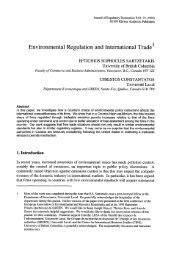HISTORICAL DICTIONARIES OF EUROPE Jon Woronoff, Series ...
HISTORICAL DICTIONARIES OF EUROPE Jon Woronoff, Series ...
HISTORICAL DICTIONARIES OF EUROPE Jon Woronoff, Series ...
You also want an ePaper? Increase the reach of your titles
YUMPU automatically turns print PDFs into web optimized ePapers that Google loves.
2 • AEGEAN SEA<br />
Some reforms aiming at streamlining, introducing some meritocracy,<br />
and information and digital technology have been—gradually<br />
and reluctantly—put in place since the 1990s, with mixed results.<br />
Public administration is one of Greece’s most serious, urgent, and<br />
difficult problems to be solved today.<br />
AEGEAN SEA. Named after Aegeas, king of Athens and father of<br />
Theseas, the Aegean is the sea between mainland Greece and Asia<br />
Minor. The Aegean has played a unique role in shaping Greece and<br />
Greek culture. The Aegean is an archipelago of 8,000 islands, islets,<br />
and rock formations of stunning beauty. Mild and green in the north,<br />
dry and windy in the south, the Aegean has provided the ecosystem<br />
for the development of maritime civilizations based on the sea and<br />
sea trade.<br />
Trade was facilitated by high winds, the short distances between<br />
most Aegean islands, and the Aegean’s geostrategic position among<br />
the three continents of Europe, Asia, and Africa. From 3500 to<br />
1100 BCE, the archaic Cycladic civilization in the Cycladic islands<br />
flourished together with the Minoan civilization in Crete. In the<br />
fifth century BCE, most of the Aegean Islands became part of the<br />
Athenian hegemony. Later, the Aegean fell under the control of the<br />
Roman Empire and its successor, the Byzantine Empire. As imperial<br />
control weakened, piracy thrived and Crete was briefly lost to the<br />
Arabs in the 10th century CE. Following the Fourth Crusade, much<br />
of the Aegean fell under the control of the northern Italian city-states<br />
of Venice and Genoa. Under Venice, trade and culture grew. Today,<br />
in a few Cycladic islands, some Catholic communities survive within<br />
an otherwise overwhelmingly Greek Orthodox nation. Gradually,<br />
the Ottomans, the previously reluctant navigators, managed to expel<br />
the Venetians, but Crete was not seized until 1669 CE. During the<br />
Napoleonic Wars, some islanders, especially in Hydra, Spetses, and<br />
Psara, amassed great fortunes by breaking the British continental<br />
embargo. Their wealth served as the basis of an emerging procapitalist,<br />
moneyed economy and, after 1821, financed the Greek War of<br />
Independence.<br />
Modern Greece established its sovereignty over the Aegean in<br />
the course of more than a century. In 1830, Greece incorporated the<br />
small Saronic islands close to Athens, the Cyclades, and the Spo-<br />
09_152_02_Dictionary.indd 2<br />
3/30/09 9:46:59 AM
















